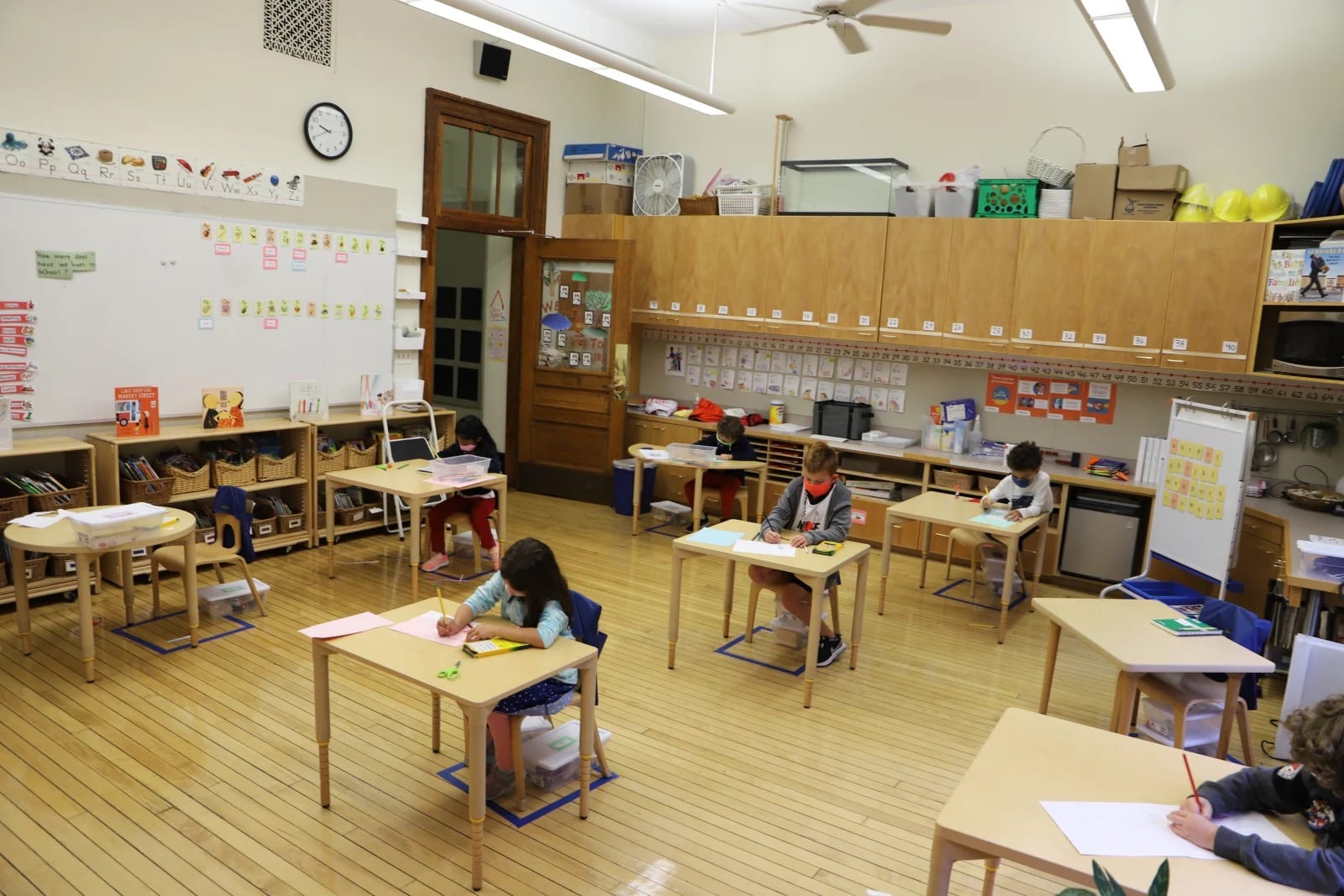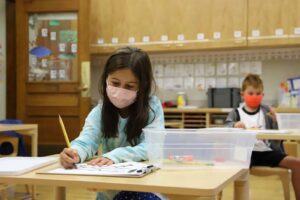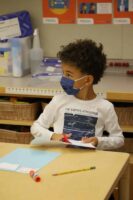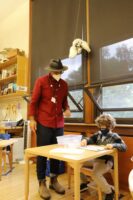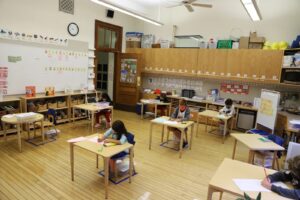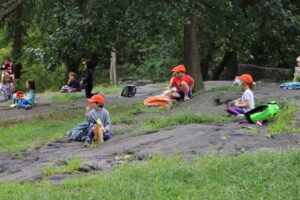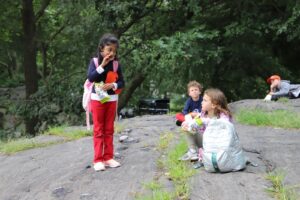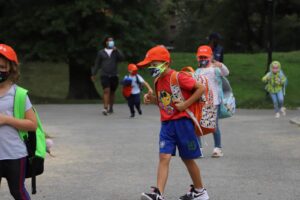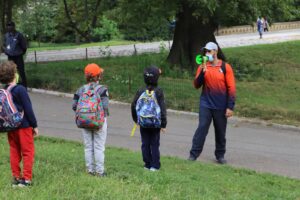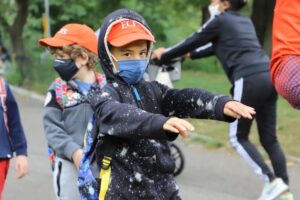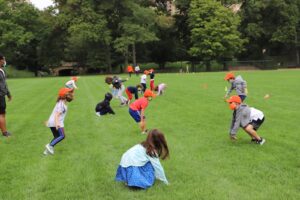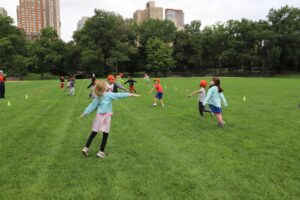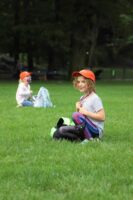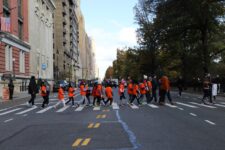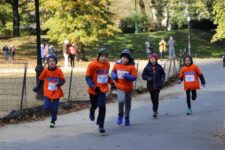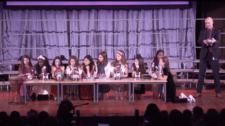Beckett W. ’32 wants to install Plexiglas barriers that will shield everyone in his classroom from the risk of virus transmission. He’s constructing a sign to illustrate his concept — cutting out drawings he’s sketched by hand and gluing them onto pale blue card stock — and he’s called over Ethical Culture 1st Grade Teacher José Ramos to inspect his work.
Ramos, wearing his trademark cowboy hat and a white mask, finishes helping another of the students in his pod and comes over to Beckett’s desk. “Do you think this is large enough that someone walking by will see it?” he asks. Beckett thinks it over for a second, then begins tracing a larger rectangle so he can scale up his drawings.
In a separate room, Associate Teachers Garmen Xie and Renee Jones are leading the other pod of 1st Graders through the same assignment. Cameras, microphones, and digital screens in both classrooms allow Ramos to broadcast his lessons to all his students, even as Ramos oversees his pod of students and Xie and Jones oversee theirs.
It’s barely 9:30am, but students and teachers alike are already kicking things into high gear, ready to tackle the day of on-campus learning ahead.
At 10:30am, the 1st Graders head to Central Park, where — barring a few requisite bathroom breaks — they will remain for the next three hours. First up is snack time, and the students, sporting bright orange ECFS caps, munch on SkinnyPop popcorn as the adults issue gentle reminders to sit six feet apart.
The bulk of this mid-morning session is taken up by PE class, led by PE Teacher David Sroka and Associate Teacher Chris Viven. Energized by popcorn and by the thrill of being outside on a gorgeous September day, the students are visibly excited. Leading his students from one field to another, Sroka tells everyone to hold their arms in front of them like zombies so they remember to physically distance.
Standing beside plastic cones spaced out on the grass, the 1st Graders go through a circuit of warm-up exercises: jumping jacks, burpees, stretches. Beckett is placed in a group with his friend Remy O. ’32, and, while keeping their masks on, they sprint and frog-jump across the field.
After lunch, the class reconvenes to engage with another facet of Central Park’s many offerings: its natural resources. Ramos, Xie, and Jones task their students with hunting for “earth treasures” — leaves, pebbles, and other bits of terrain and flora — and drawing them on pieces of paper. Before they can draw them, though, they must count them — and this intermediate step offers the teachers the opportunity to reinforce basic numeracy skills. Holding out four pebbles, Ramos encourages the class to consider all the ways they can visualize the number four: as four individual units, as two pairs, or as three plus one or one plus three. This simple but crucial skill will serve as the foundation for more advanced arithmetic concepts later in the year.
The earth treasure hunt is a multi-step process — find the treasures, count them, and sketch them — that both develops 1st Graders’ visual-spatial and mathematical skills and builds up their stamina as they learn to take on assignments of increasing complexity. At the same time, it’s pure enjoyment for the students: “We’re trying to blend learning and fun,” Xie explains. As the 1st Graders run around the park, carefully searching for and handling pieces of nature that most adults would overlook, it’s not hard to see how, even with the constraints of the ongoing pandemic, the best of progressive education can thrive.
Central Park — with its sprawling lawns, ever-changing foliage, and complicated history of community displacement and gentrification — has long been a core focus of the 1st Grade curriculum. This year, it promises to feature prominently not only in 1st Grade, but also in all grades at Ethical Culture, as the School looks to take full advantage of the abundant outdoor green space at its doorstep.
Even when learning happens indoors or remotely, though, faculty are ready to offer a robust and relevant education. During one of the phase-in days when his entire class is remote, Ramos leads a Google Meet call, while Beckett, Remy, and their classmates in both pods tune in. On the screen is a virtual whiteboard to which Ramos has affixed several fluorescent “sticky notes” with words like “safe,” “glad,” and “seen.”
“How do we want to feel when we are in our classroom?” he asks.
The 1st Graders take turns chiming in with words and phrases they want to add to the whiteboard, holding up thumbs and typing their names in the chat window when they want to speak. As he listens to his students’ suggestions, Ramos types them onto fresh sticky notes, dragging them into place. With the words collated, he then instructs his students to draw and write about an experience that gave them a positive feeling while in class. Some of the 1st Graders finish early, so Ramos nudges them with a mantra: “When you feel done, you have just begun.”
Beyond building creative and literacy skills, this activity taps into social emotional learning, an area of growth that has only become more vital due to the mental and emotional tolls inflicted by the COVID-19 pandemic and by ongoing racial injustice. Thanks to an update to the curriculum recommended by Librarian Nicole Sterling, who is leading a 1st Grade class this year, the 1st Graders also look at photos of children around the world and consider themselves as members of a global network. As such, the activity ties into the School’s mission of building ethical citizens of the world.
When you feel done, you have just begun.
“This lesson is part of a larger ‘care-taking’ unit,” Ramos explains. “Next, we will take these shares and generate community norms in an effort to provide the children with ownership and agency over their classroom community.”
Back at Central Park, the 1st Graders replace their newfound treasures and return to the classroom to conclude the day. Ramos wraps up his class by reading from Maria Dek’s “A Walk in the Forest,” a picture book that explores the wonders offered by nature.
It’s thrilling to realize that the 1st Graders have finished a full day of in-person school, exploring the wonders of nature and all. Both the innovative curriculum and the intricate logistics required to actualize it are direct results of a summer’s worth of preparation as the Ethical Culture Fieldston School has figured out how to bring students and faculty safely back to campus.
The biggest indicator that it’s been a success? For Ramos, Xie, Jones, Sroka, and Viven, today was the culmination of months of hard work. For 1st Graders at Ethical Culture, today was just another day of school.
